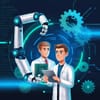Artificial intelligence (AI) is transforming the engineering landscape, but it's unlikely to replace engineers entirely. Instead, AI will augment their capabilities, making them more efficient and productive. AI is automating repetitive tasks like data analysis, simulations, and code generation, freeing up engineers to focus on complex problem-solving and creative design solutions.
AI-assisted design tools are also enhancing the design process, generating multiple design options, optimizing performance, and predicting potential issues. This allows engineers to make informed decisions and develop more efficient solutions. Additionally, AI-powered predictive maintenance systems can detect potential equipment failures, enabling proactive maintenance and reducing downtime.
While AI may automate some tasks, it's creating new opportunities for engineers in areas like AI-assisted design, robotics integration, data science, and cybersecurity. To thrive in an AI-driven industry, engineers need to develop skills like machine learning techniques, data analysis, digital twin technology, and sustainable design.
By leveraging AI tools and developing new skills, engineers can focus on high-level problem-solving, creativity, and innovation, leading to a more efficient and effective industry. Ultimately, AI is not replacing engineers but redefining their potential, enabling them to work more efficiently and effectively.


